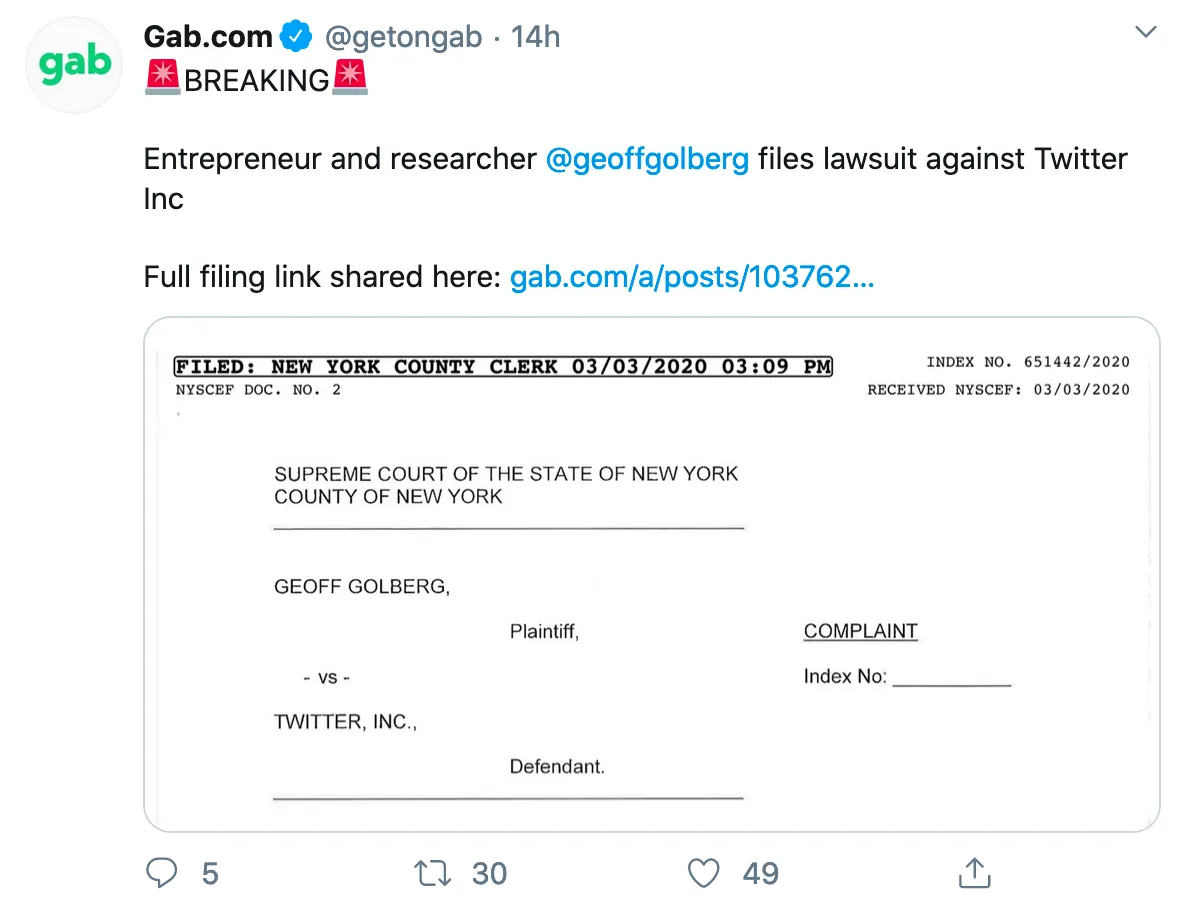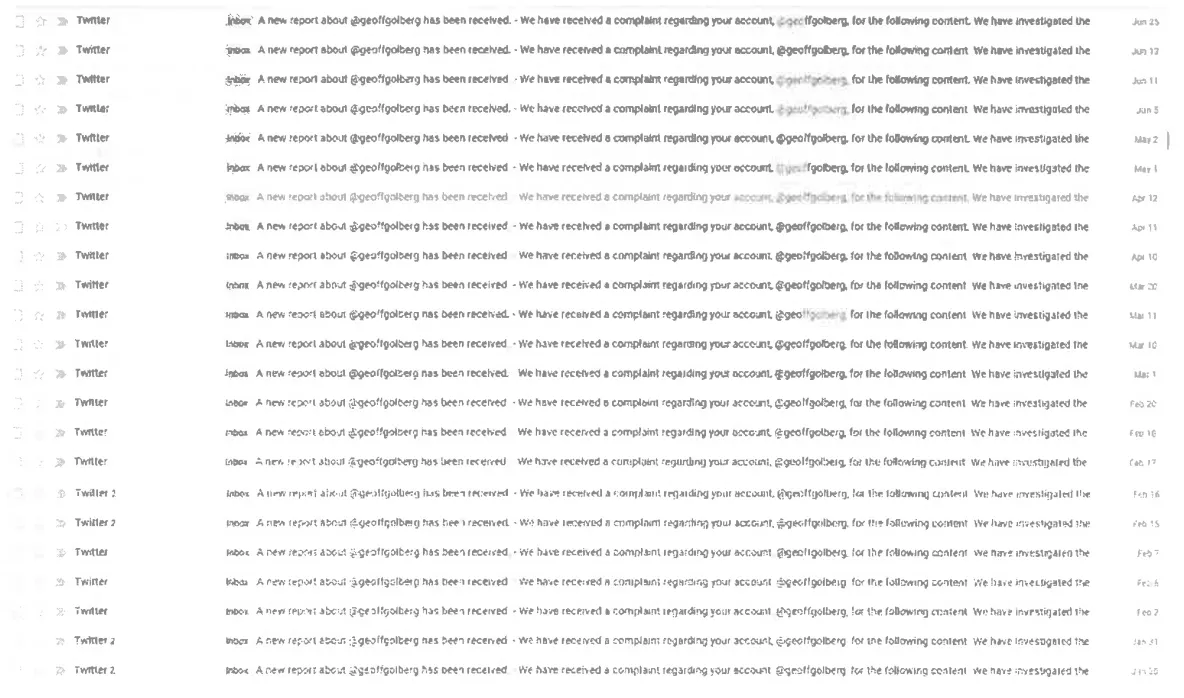In brief
- Geoff Golberg was kicked off Twitter last year.
- He claims hundreds of inauthentic accounts reported his Twitter account.
- He is suing Twitter for unfairly removing his account.
Data researcher Geoff Golberg served Twitter with a lawsuit yesterday for banning him from the site. He states that in his fight against Twitter bots—which Elon Musk said yesterday was the big problem with Twitter—he ended up being rude to inauthentic accounts, which led to his account being deactivated on July 22, 2019.
Golberg’s lawsuit has some interesting quirks. For a start, he poses it as a contractual dispute, claiming that he “paid” Twitter with his user data when he signed up to use the site, and that, by paying for sponsored posts, he had a business relationship. Further, he claims that the Twitter bots ganged up on him, mass reporting him to Twitter—which is the opposite of how any social media site should work. Ironically, he adds that, when appealing the decision, Twitter wouldn’t let him speak to a human being, only bots.
Who is Geoff Golberg?
Golberg is the co-founder of Elementus, a blockchain data analytics provider, which has released analyses of hacks from major crypto exchanges Cryptopia ($3-13 million) and CoinBene ($105 million). He left that company and recently founded a project called Social Forensics, which provides analysis of social media manipulation. A respected analyst and economics major at the University of Pennsylvania, his work has appeared in the BBC, CNN and Quartz.

This isn’t the first time Twitter has banned Golberg. He used to do a lot of live video streaming on Meerkat and Twitter-owned Periscope. However, in April, 2017, Periscope booted him from the network, citing violations of its community guidelines.
That’s what sparked his interest in blockchain technology, and its potential to overturn tech monopolies such as Facebook, Google and Twitter. “Big tech has so much power, they can opaquely and unaccountably remove someone from their platform, just like this,” he told Decrypt, in a previous interview.

Inside Geoff Golberg’s war against the Twitter bots and the XRP Army
Throughout 2018, data scientist Geoff Golberg was doxxed repeatedly and received numerous death threats. His crime? Exposing the numbers of inauthentic and automated (bot) accounts on Twitter. The issue of fake accounts has plagued Twitter, especially in relation to meddling in the U.S. Presidential election. In July, 2018, the social network said it had wiped tens of millions of fake accounts from the platform. Yet Golberg has continued to point out the numbers of suspicious accounts, related t...
Golberg’s lawsuit was put together by a combination of two popular crypto lawyers—Stephen Palley and Preston Byrne—who now both work at Anderson Kill. It seeks damages between $25,000 and $50,000 and the reinstatement of his Twitter account.
We have reached out to Twitter and will update this article if we get a response.
Golberg’s case against Twitter
The lawsuit makes three main claims against Twitter. Firstly, that it terminated Golberg’s account for using words that are exceedingly common on the platform, such as “moron.” Secondly, that he used these words against an inauthentic account, not a real human being. And finally, that the appeals process can be summed up with the phrase, “computer says no.”

It revolves around the idea that Golberg has a contractual relationship with Twitter. “There are no “free accounts” on Twitter—that is a misnomer,” the lawsuit stated, adding, “User data is the currency that all users provide to Twitter for access, and it becomes a valuable asset that Twitter then sells to platform advertisers.” This practice, although once not widely known about, is now fairly common knowledge since Facebook’s Cambridge Analytica scandal.
Further, Golberg paid $38,700 to promote his tweets on the platform over 10 years. The lawsuit quotes Twitter’s own filing stating that promoted tweets, accounts and trends make up the most of Twitter’s ad revenue. With this business relationship, he argues that Twitter shouldn’t have been able to deactivate his account at will, with few means of protest available to him.
Attack of the clones
Golberg’s lawsuit also explains why Twitter was motivated to deactivate his account.
As Decrypt has reported previously, Golberg spent a lot of his time exposing bot and inauthentic accounts on Twitter. An inauthentic account is, simply, an account set up by a real person—usually someone influential or a would-be influencer—who buys legions of fake followers, and tweets at will. By contrast, a bot account doesn't necessarily have many or any followers, but is run by a computer program and typically spews forth hundreds of tweets a day.

How Saudi Arabia’s disinformation campaign is linked to the XRP Army
Why are so many twitter accounts shared by a Saudi Arabia disinformation campaign, and the XRP Army? The Friday before Christmas, Twitter dumped millions of tweets worth of data for researchers to pore over—which got the attention of noted analyst of social network sites, Geoff Golberg of Social Forensics. In a post today, Golberg linked a surprising number of those Saudi accounts to the XRP Army, a swarm of over 40,000 Twitter accounts devoted to spreading the gospel of XRP. Though that sounds...
Golberg has exposed a large amount of bots set up to promote the cryptocurrency XRP, known informally as the XRP Army. He has reported on the number of inauthentic accounts belonging to the Iranian political-militant organization called the People's Mujahedin of Iran (MEK), bot armies in Saudi Arabia and even fake accounts helping to manipulate the vote in North Carolina.
Twitter has even validated his research, in many ways. Last year, Twitter banned 88,000 Saudi Arabian Twitter accounts it deemed to be part of a bot army. At the time, Golberg said it was a drop in the ocean compared to the “millions” of accounts that form disinformation campaigns on Twitter.
The bots fight back
In exposing these inauthentic and bot accounts, Golberg put himself in the firing line. Scores of bots—controlled by botmasters—reported his account en masse, flagging it constantly to Twitter. Unsurprisingly, seeing so many flags, Twitter simply blocked his account.

Worse, some of the perpetrators remain at large. One account found information about Golberg and publicly released it, a process known as doxxing. The lawsuit reports that doxxing is a violation of Twitter’s terms of service, yet the account that doxxed him remains at large.
When Golberg was dealing with these bots, inauthentic accounts and doxxing efforts, he became frustrated. He used language, such as, “your account will soon be suspended, moron,” “fuck off, moron,” and “good luck with that, idiot.”
The lawsuit acknowledges that this language might seem discourteous but that it’s used thousands of times per day on the social media site. Some accounts even have such words in their Twitter handle, name and all over their profiles.
Twitter’s opaque appeals process
Golberg’s final challenge to Twitter centres on its appeals process. He argues that, when faced with his account being closed, he was unable to speak to a real human being about it.
First, his account was suspended. Twitter’s terms of service state that its users can appeal a suspended account, but “no human interaction or communication is offered to facilitate such appeals,” the lawsuit writes. Golberg sent two letters to Twitter, which went unanswered. When the appeal process failed, Twitter permanently suspended his account, informing him via a no-reply email.
Golberg continues to have no access to his account, his contacts through the account or content held on the account. In the lawsuit, he ponders if Twitter continues to possess this data, using it for its own gain.
But if hiring lawyers doesn’t work, Golberg could always try building his own bot army.




